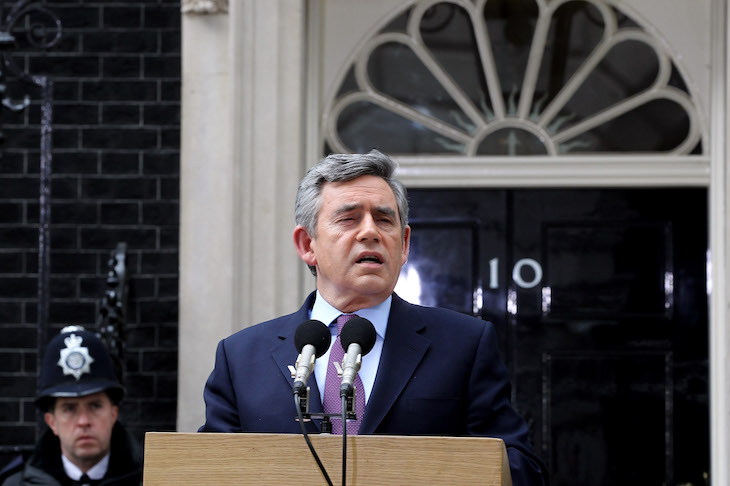Gordon Brown has pitched his memoirs as the honest confessions of a decent man. He failed to win the one general election he fought, he asserts, due to a personality that was unsuited to an age of Twitter and emotional displays. His is the Walter Mondale response to failure — the former US vice president said of his defeat in the 1984 presidential election: ‘I think you know I’ve never really warmed up to television, and in fairness to television, it’s never really warmed up to me.’
Admitting to poor media skills is not genuine self-examination on the part of Brown, more an attempt to shift the blame for his failures on to something he considers trivial. He continues to believe that he had the better philosophy and ideas — just that they were too dry and too complex to be absorbed by an impatient, perhaps shallow, British public. ‘I failed to persuade the British people that the progressive policies I pushed for, nationally and internationally, were the right and fairest way to respond.’
The Labour party has always been far better than the Tories at talking about — and defining — recent history. Tories tend not to bother, thinking that facts speak for themselves. The trouble is that they don’t, as Sir John Major found out when an extraordinary economic recovery was of no help to him in 1997. If Labour starts to define the 2010s as a decade of austerity and misery, it will set the scene for a Labour victory in 2020. That makes it worth looking at Mr Brown’s analysis of the 2010 general election, and what followed.
His policies were not ‘progressive’. He had vastly expanded the size of government, running up massive debts. He fractured the banking regulatory system, letting the City of London run riot. His refusal to reform welfare trapped millions on the dole, even in good times. When his debt-fuelled boom turned to bust, unemployment soared. It was precisely in pursuit of progressive policies that voters turned to David Cameron and the Conservative party.
The nation’s recovery then began. It was a time of austerity: half a million public sector jobs were cut back, but private sector employers created eight jobs for every one shed by the government. Britain experienced an employment boom the like of which had never been seen before. Education reform saw hundreds, then thousands of schools become self-governing academies. The number of children in schools marked ‘good’ or ‘outstanding’ ran to a record high. Pupils in the best 300 state schools are now achieving better A-levels than in the best 300 private schools.
The Bank of England had to revise down its estimate of ‘natural’ unemployment because the Tory tax cuts for employers and employees meant more people were employed than economists ever envisaged. These cuts were focused on the lowest-paid, forcing income inequality to its lowest rate in 30 years. The top rate of tax was cut for the best paid, which had the effect of squeezing even more tax revenue out of them. The best-paid 1 per cent now contribute 28 per cent of income tax and the 0.01 per cent contribute 4 per cent — statistics that the Treasury has never published, which is odd seeing that they vindicate the principle that lower tax rates lead to higher revenues.
Any list of Britain’s richest people will show how many job-creators choose to live, work and pay tax here. The lower-paid half of the British workforce is now asked for less than 10 per cent of total income tax. Never has so little been asked from so many. It’s quite true that Britain became a magnet for EU nationals whose governments struggled to create jobs — but even that hasn’t sated the demand for workers. One of the biggest problems businesses face now is a lack of people to hire. It’s a problem, but a problem of success. If Britain had refugees camped in Dover, risking their lives to get to Calais and start a new life in France, we would have greater cause to worry.
Wages have been slow to recover, but lower taxes mean that disposable income is nonetheless at a record high. Crime has been rising recently, yet it remains lower than in any of the Labour years — a testimony to the professionalism of the police, who (like local government officials) have found new ways to achieve more with less money. The word ‘austerity’ is often used to suggest a dark era of penury. But any graph of incomes since 2010 shows that those on the lowest incomes are thriving, and those on the highest incomes faring the worst. It would be better if everyone did well, but it’s hard to argue that the proceeds of growth have been unfairly distributed.
Had Gordon Brown achieved any of these things we would never have heard the last of it: it would have been reeled off across the dispatch box every time he stood up to speak. Yet the Conservatives mention almost none of their successes. Some details need to be prised from the government via Freedom of Information requests. The Tories seem to be as ashamed of their achievements as Labour was of its failures; its MPs have started to talk and act as if the next election is already lost. It isn’t, but it will be if enough of them believe it to be so.






Comments